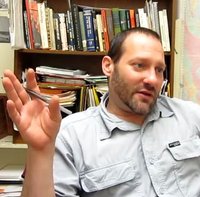CSUN’s Smith Lecture to Explore Changes in Human Evolution
While Darwin was correct in his essential findings on evolution, recent scientific discoveries have changed what is known about human evolution.
Cameron M. Smith, a prehistorian at Portland State University, will examine how research is changing scientific understanding of the evolutionary process and opening doors for new fields of study — from DNA repair to cultural evolution — that were only ideas a decade ago as part of California State University, Northridge’s Richard W. Smith Lecture Series on Thursday, April 3.
The lecture, hosted by CSUN’s College of Social and Behavioral Sciences, is scheduled to take place at 7 p.m. in the Whitsett Room, Sierra Hall 451, on the west side of the campus located at 18111 Nordhoff St. in Northridge.
“Dr. [Cameron M.] Smith is a well-respected expert in his field and his talk should prove very interesting,” said Richard Smith, a retired CSUN psychology professor who created the Richard W. Smith Endowment in Cultural Studies at CSUN and the Richard W. Smith Lecture Series.
Cameron Smith’s work focuses on human evolution — past, present and future. He began his study of anthropology with the Leakey research team in northern Kenya and has conducted archaeological fieldwork worldwide. He has been published widely in peer-reviewed technical journals, including the “American Journal of Physical Anthropology,” “Physics of Life Reviews,” “Oxford’s British Archaeological Reports,” “Acta Astronautica,” “Journal of Field Archaeology” and “International Monographs in Prehistory.” Smith also has written for such general public magazines as “Scientific American,” “Omni,” “MIND,” “Archaeology” and “Spaceflight.”
Smith also has authored several books on evolution, including “The Top Ten Myths about Evolution” and “The Fact of Evolution.” He appeared on PBS, the History Channel, the National Geographic Channel and many radio shows, including “Bob Edwards Weekend,” Michio Kaku’s “Scientific Fantastic” and “Scientific American” podcasts.
The lecture is free and open to the public. However, seating is limited. For more information about the event or to reserve a seat, call (818) 677-4030.


 experience
experience